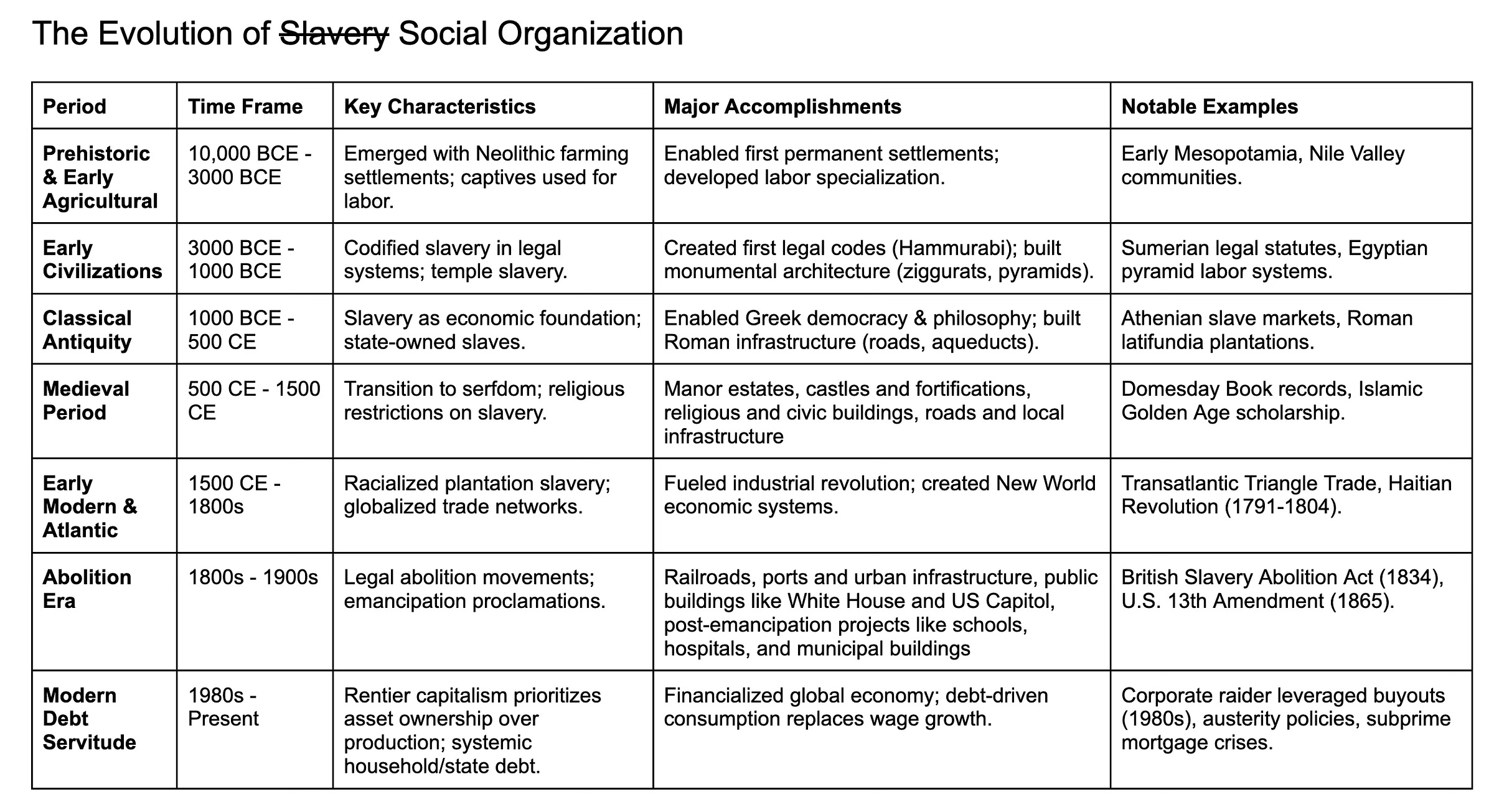
The audio above is an AI-generated 'podcast' crafted with careful prompting and highly selected data sources, which you can view here.We’re comfortable with most stories about human progress.
Except this one.
For 12,000 years, our most magnificent achievements — from the pyramids to the industrial revolution to our smartphones — have depended on a system we’ve swept under the carpet.
Slavery isn’t just history’s great shame. Slavery has been history’s most effective human coordination system, accomplishing much of what we call human progress.
While this realization may make us uncomfortable, slavery never actually went away.
From Chains to Paychecks: Same System, Different Packaging
When the Neolithic Revolution gave us agriculture around 10,000 BC, it created a new problem: how do you coordinate human labor at unprecedented scales?
The answer was simple and brutal. Whip people to work.
The Greeks built democracy and philosophy on the backs of slaves. The Romans built roads and aqueducts the same way. The coal that fueled the industrial revolution? Mined by chain gangs.
Each era told itself a story about why its particular form of forced labor was necessary, natural, or even beneficial.
Feudalism wasn’t slavery, they said. It was protection.
Wage labor isn’t servitude, they insisted. It’s freedom to choose your employer and spend your hard-earned money on whatever delights your heart desires.
Today’s debt-based economy isn’t bondage, or so we’re told. It’s opportunity.
But look closer at the patterns. Control. Extraction. Coordination at scale. The packaging changes while the operating system remains.
All of a sudden, “the invisible hand” doesn’t look quite so benign.
The Uncomfortable Paradox
Here’s the inconvenient truth we struggle to face: humanity’s greatest achievements emerged from our most oppressive systems.
The tech that powers your banking app? Built on servitude.
The architectural principles behind modern cities? Refined through projects built by slaves.
The global supply chains delivering your next-day packages? The slick operation of a system that cleverly obscures who’s trapped in servitude.
Progress and exploitation have been locked in a dance for millennia.
Each step forward in human capability has depended on our ability to coordinate massive human effort. And until now, that coordination has required some form of bondage — whether physical, economic, or psychological.
The Evolutionary Impulse — the in-built human drive to create and improve — has persisted despite these draconian systems of control, not because of them.
Like water finding cracks in concrete, human ingenuity has always found ways to express itself even within structures designed to control it.
Economic Servitude: Slavery's Modern Face
In 2025, we don’t use whips. We use mortgages.
We don’t use chains. We use student debt.
We don’t use overseers. We use algorithms. And income tax.
Today’s coordination system is Rentier Capitalism — where wealth is extracted not through productive enterprise (Industrial Capital) but through sophisticated mechanisms of rent-seeking.
Freedom, we’re told, means we have the free choice to choose between employers — or politicians — who all demand the same sacrifice of time, creativity, and purpose.
“Freedom” has morphed into “I owe, I owe, so off to work I go.”
Freedom feels like spending our most vibrant decades servicing debt rather than living a fulfilling life. Welcome to slavery in 2025.
The global economy cannot function without coordinated human effort at massive scale. But instead of owning people outright, the elite class has created systems that make people believe they own themselves while functionally limiting their choices.
This isn’t conspiracy. It’s the evolution of social organization.

The Breakthrough Moment
Slaves accepted systems of control because the alternative — starvation, violence, or death — seemed worse than the certainty of bondage. Those with power made alternatives impossible to imagine, let alone implement.
Now, for the first time in human history, we the people have the tools — and the choice — to coordinate human ingenuity and creativity at scale, without control.
Digital technologies enable cooperation at scales previously possible only through hierarchy and enslavement.
Ecological science gives us frameworks for understanding complex systems that previous eras couldn’t imagine.
The bioregional regeneration movement (to be discussed in a future essay) isn’t just another nice idea about saving the planet. It’s potentially the next evolutionary leap in how humans coordinate their efforts.
This movement recognizes something fundamental: we can organize around place rather than power.
Around ecological health rather than extraction.
Around distributed governance rather than centralized control.
Emerging technologies monitor systemic health of commons-based coordination and mutual aid networks, rather than tracking worker productivity and maximizing shareholder value.
The Material Consciousness that currently fuels consumer culture is transitioning to Mycelial Consciousness that nurtures bioregional identity and incentivizes regenerative practices.
For 12,000 years, various forms of bondage have been used to solve the coordination challenge. What if we don’t need to anymore?
The Choice Before Us
Thesis → Antithesis → Synthesis
Every time we doom scroll — climate disasters, political chaos, wealth inequality — we’re participating in the thesis.
Still enslaved. Still plugged into forms of control.
That endless feed of problems without solutions? It’s the dying gasp of Neoliberalism and the desperate attempt to lure us into Technofeudalism — today’s thesis of digitally-enhanced control.
The antithesis is already emerging in bioregional regeneration — decentralized, place-based governance that rejects the extractive model.
When citizens partner with municipalities in conscious civic leadership (to be discussed in a future essay), we create the synthesis — a coordination system focused on regeneration rather than extraction.
Hegel would recognize this pattern. Every system contains the seeds of its replacement.
The journey from thesis to synthesis won’t be simple. But the pathway is clear.
For 12,000 years, humanity coordinated at scale through various forms of servitude because the alternatives were less appealing than slavery.
Now we have alternatives, and they’re stupendously more appealing than slavery.
The question isn’t whether slavery in all its forms will eventually end. It’s whether you’ll choose to be part of creating what comes next.
The tools exist. The knowledge exists. The network exists.
What are you waiting for?
Author’s Note
Not all conversations are created equal.
Most Substacks operate at the Headlines level — commenting on yesterday’s news, tomorrow’s outrage. The immediacy is addictive. The impact is fleeting.
Some elevate to Horizons — they’ll give you strategic outlook across decades. Strategic thinking that helps you navigate the currents.
Then there’s Heritage — the full human story and its future implications. Different altitude. Different conversation entirely.
This is a Heritage-level Substack.
The (many) direct messages I’ve received tell me there’s a hunger for wisdom that applies to your daily life, your organizational strategy. I see you. I value your questions.
But I can’t respond to each one and still maintain the perceptual clarity needed for this work.
The alternative? Join us for four webinars starting May 12th. We’ll translate between Headlines, Horizons, and Heritage. We’ll connect patterns to practices. We’ll build bridges from the ancient past to your tomorrow.
Heritage-level thinking creates the map. You create the path.
I hope you’ll join us for the webinars and support the research we’re conducting. Full details here: https://thesis.michaelhaupt.com/cf
References
Evolutionary Impulse: The innate drive—an active organizing principle—within all living systems to adapt and evolve into higher expressions of itself. Deep Dive
History of Slavery: From 10,000BCE to today, slavery and forms of brutal control has existed across diverse civilizations and cultures. https://en.wikipedia.org/wiki/History_of_slavery and Deep Dive.
Dialectical Evolution of Slavery: Unpacks the Thesis → Antithesis → Synthesis process for each form of slavery throughout history. Deep Dive
Income Tax: For an enlightening documentary that unpicks the common belief that taxes are the primary mechanism for funding public spending, watch Finding the Money. It makes the compelling case that, since states issue currency into circulation, they don’t need income tax to fund spending. They need income tax to encourage acceptance of the currency.
Rentier Capitalism: The generation of income through ownership and control of assets rather than through productive economic activity. https://en.wikipedia.org/wiki/Rentier_capitalism and Deep Dive.
Hegelian Dialectics: Often represented in simplified form as a three-stage process of Thesis → Antithesis → Synthesis. https://en.wikipedia.org/wiki/Dialectic and Deep Dive
Arthashastra: An ancient Indian Sanskrit text which translated means a “treatise on political science,” “economic science,” or simply “statecraft,” reflecting the text's broad conceptual scope, with a narrow focus on class-based acquisition and maintenance of power. https://en.wikipedia.org/wiki/Arthashastra and Deep Dive
Technofeudalism: The next form of slavery and control, using surveillance and digital currencies to nudge behavior. The concept is fully explained in a 2024 book, Technofeudalism: What Killed Capitalism by Yanis Varoufakis: https://www.amazon.com/dp/1685891241, https://en.wikipedia.org/wiki/Technofeudalism, and Deep Dive.













Share this post